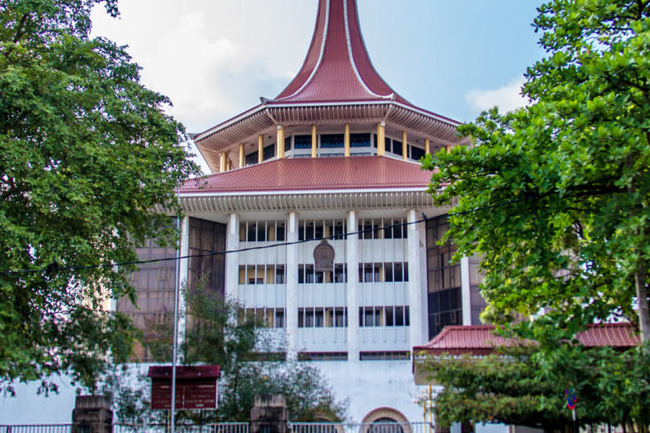SC conveys determination on Anti-Terrorism Bill to Speaker
February 20, 2024 10:02 am
The Supreme Court on Tuesday (20 Feb.) conveyed its decision on the much-disputed Anti-Terrorism Bill to Parliament Speaker Mahinda Yapa Abeywardena.
Accordingly, the Supreme Court determined that while several clauses of the proposed legislation require to be passed by a special majority, several other provisions of the Anti-Terrorism Bill need to be passed by both, a special majority and a referendum, unless amendments recommended by the Supreme Court are carried out.
On 02 February, the Supreme Court concluded the hearing of petitions filed challenging the government’s new Anti-Terrorism Bill following the lengthy proceedings that continued for six days in total.
Thirty-one petitions had been put forward against the proposed legislation which seeks to replace the controversial Prevention of Terrorism Act (PTA).
Among the petitioners are His Eminence Malcolm Cardinal Ranjith, General Secretary of Samagi Jana Balawegaya (SJB) Ranjith Madduma Bandara, National People’s Power (NPP) MP Vijitha Herath, Centre for Policy Alternatives (CPA), Socialist Youth Union (SYU), Duminda Nagamuwa of Frontline Socialist Party (FSP) and the Ceylon Teachers’ Union (CTU).
The Attorney General has been listed as the respondent of these petitions filed seeking a Supreme Court order mandating a parliamentary vote with a two-thirds majority and a referendum to pass the Bill, which was tabled in the parliament on January 10.
They say the Bill, if passed in its current form, would grant unlimited powers to the Tri-Forces, the Police and the Coast Guard to make unwarranted arrests without reasonable suspicion, and this is a violation of the fundamental rights including the freedom of expression guaranteed by the Constitution.
Attached below is the press release issued by the Parliament today in this regard:
Supreme Court Determination on the Bill titled “Anti-Terrorism”
The Deputy Speaker of Parliament announced to Parliament that the Speaker has received the Determination of the Supreme Court in respect of the Bill titled “Anti-Terrorism” which was challenged in the Supreme Court in terms of Article 121(1) of the Constitution.
Accordingly, the determination of the Supreme Court as to the Constitutionality of the Bill concludes as follows: —
• Clause 3, Clause 42, Clause 53, and Clause 70 of the Bill are inconsistent with Article 12(1) of the Constitution and required a Special Majority to be passed by Parliament. However, the Supreme Court has stated that the said inconsistencies can be ceased if the said Clauses are amended as per the Determination of the Court.
• Clause 4 has to be suitably amended as per the Supreme Court Determination. • Clause 72 (1) is unconstitutional and needs to be passed by a Special Majority and a Referendum. The unconstitutionality will cease if this Clause is amended as per the Determination of the Supreme Court.
• Correspondingly, Clause 72(2) must be amended in accordance with the Determination.
• Clause 75 (3) infringe the Article 4 (c) read with Article 3 of the Constitution and required 2/3rd Majority and a Referendum. The invalidity will cease 7 upon the amendments suggested in the Determination.
• Clause 83 (7) requires a Special Majority to be passed into law. It has to be suitably amended as per the Supreme Court Determination.
Further, the Supreme Court has determined that subject to the amendments that have adumbrated to the provisions of the Bill by the Supreme Court, the Bill could be enacted into law with a Simple Majority only if the amendments determined by the Supreme Court are introduced to the provisions.












